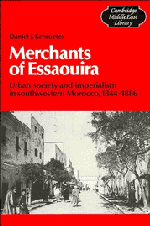Book contents
- Frontmatter
- Contents
- List of illustrations
- Map 1 General map of Morocco
- Preface
- Notes on usage
- Abbreviations
- Chronology
- 1 Introduction
- 2 The royal port
- 3 Merchants of the Sultan
- 4 Port and bazaar
- 5 Beyond the walls
- 6 The politics of trade
- 7 Foreign intervention and domestic reforms
- 8 The struggle for the southwest
- 9 The people of Essaouira in precolonial times
- 10 The end of an era
- Appendix A Corcos collection: nineteenth-century Arabic documents (1843–83)
- Appendix B Population estimates of Essaouira
- Appendix C Balancing revenue and expenditure: accounts of the port
- Appendix D Trade statistics for Essaouira
- Notes
- Bibliography
- Index
10 - The end of an era
Published online by Cambridge University Press: 04 August 2010
- Frontmatter
- Contents
- List of illustrations
- Map 1 General map of Morocco
- Preface
- Notes on usage
- Abbreviations
- Chronology
- 1 Introduction
- 2 The royal port
- 3 Merchants of the Sultan
- 4 Port and bazaar
- 5 Beyond the walls
- 6 The politics of trade
- 7 Foreign intervention and domestic reforms
- 8 The struggle for the southwest
- 9 The people of Essaouira in precolonial times
- 10 The end of an era
- Appendix A Corcos collection: nineteenth-century Arabic documents (1843–83)
- Appendix B Population estimates of Essaouira
- Appendix C Balancing revenue and expenditure: accounts of the port
- Appendix D Trade statistics for Essaouira
- Notes
- Bibliography
- Index
Summary
Essaouira's pre-eminent position as the royal port of Morocco began to decline in the 1870s. While other ports in Morocco were enjoying a boom in trade because of the large increase of imports and brisk exports in wool and grain, Essaouira was descending from its plateau. Not only was the market for some of its commodities slackening, but internal factors also need to be considered in the commercial decline. Disturbances in the Haha and the general insecurity both disrupted trade routes and pushed up food prices. The inflation rate grew. In 1873, the year in which the Haha tribesmen besieged Essaouira, the exchange had climbed to 50 ūqiya against the rivāl, a high point in Moroccan history.
While some speculators profited from these changing circumstances, many of the merchant families were having difficulties or collapsed during the crisis years. Others, such as Tūfal-ʿazz and Būhillāl lost their properties. The property belonging to the tājir Boujnah was appraised at 378,625 ūqiya (equalling about £2,300), to be sold to some Jews from Marrakesh in order to pay off debts owed to the makhzan. The umanāʿ were not sure that taking over the property was a good idea: ‘If this property were to be appropriated for the makhzan, more will be spent on it than its value, because of its decrepit condition.’
- Type
- Chapter
- Information
- Merchants of EssaouiraUrban Society and Imperialism in Southwestern Morocco, 1844–1886, pp. 209 - 217Publisher: Cambridge University PressPrint publication year: 1988



